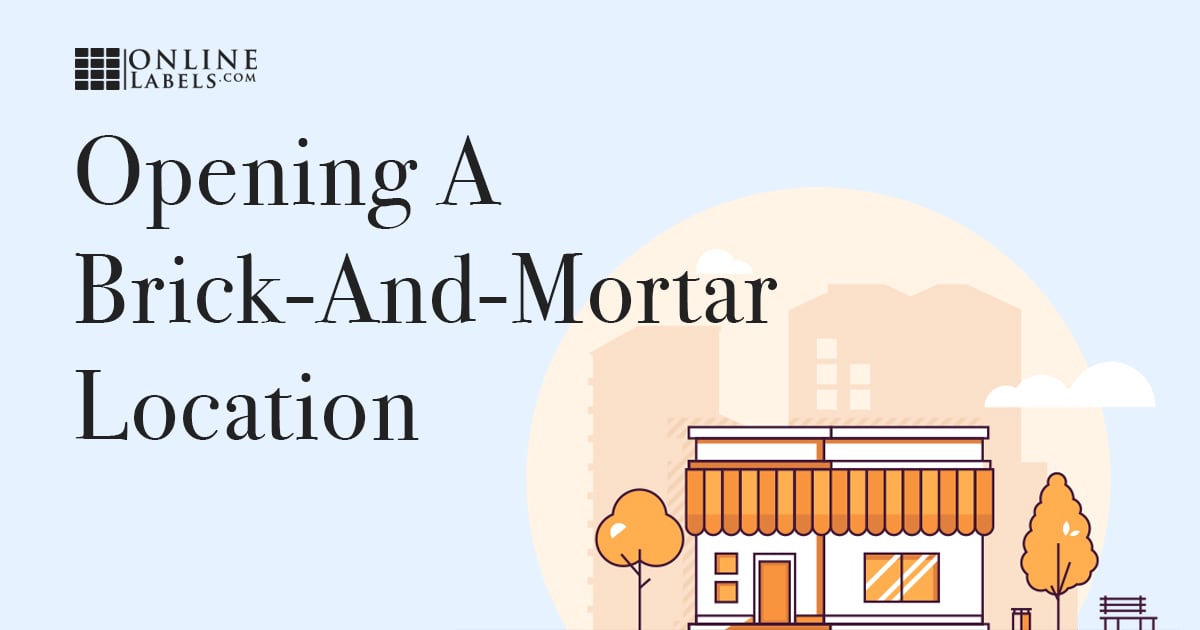Opening a Storefront? Here's What You Need To Know

Some entrepreneurs start their business with a physical location while others open up a brick-and-mortar store only after years of being in business online. No matter where you are in your journey, there may come a time when placing an "open" sign in a storefront window becomes a smart option for business growth.
While it's exciting to have a physical location where your customers can experience your brand, buy your product, or meet with your team, is it right for your business? This article dives into brick-and-mortar considerations, analyzes the benefits versus the costs, and outlines steps to getting started.
Physical Storefront Considerations
There are many things to consider if you want to do this right – from budgeting and funding your startup to determining the right location and quantifying the long-term benefits. Here are some things to consider before diving in full force.
Is Your Business A Good Fit For Retail?
You want to know that making this move is a smart idea for your business. So before you bet your bank account on it, do some test runs.
"Before opening a storefront, you have to test your market," suggests Matt Scott of Termite Survey. "Creating a 'pop-up shop' with limited expenditure and launching a trial store can help gather more specific information and feedback about how your clients will resonate with a physical location."

Another great way to get a sense of the market is to work with a boutique first, or sell at a local market.
Having a low-risk version of your store in an area you know has potential can give you a realistic sense of the foot traffic, clientele, and reception without breaking your budget. Think of it as a test trial.
Is The Timing Right?
It's no secret the COVID-19 pandemic has played a huge role in the dramatic rise of online shopping. Forbes reports there's been a 129% year-over-year growth in U.S. and Canadian e-commerce sales as of April 2020, with a 146% growth in all online retail orders.
So what does this mean for brick-and-mortars? It's hard to say since we're living in a time of uncertainty. But with more and more businesses moving online – and more people shopping online – it's essential that your reasons for opening a physical location are strong.
Sandra Hurley of Hayden Girls puts it like this: "If you are offering extraordinary customer service, a unique experience, or something that will draw customers in-store specifically as opposed to online, it can be a good move."
If you're still on the fence on whether opening a storefront will benefit your business, draft a business plan (you should do this anyway!) to ensure the idea of doing business through a storefront will be financially beneficial.
Physical Storefront Benefits
Why do you shop in person versus going online? Below, we identify a lot of those reasons as benefits to having your products on store shelves:
- Storefronts seem more authentic and reliable. "This builds confidence in your customers," says Lewis Keegan of SkillScouter.com. "Having a physical store means that your business is registered and that you are a legitimate business owner running a legitimate operation."
- Product displays are a key to discoverability and exposure. Unless people are actively looking for your product online, chances are they may never come across your brand. That's why having your products on a store shelf is so important.
- In-person means instant access. Everyone from passersby to intentional customers can purchase your product and get that instant gratification sensation.
- No guessing games. Your customers won't have to sift through reviews or photos to make an informed decision. The ability to touch and experience your product themselves creates feelings of trust. They don't have to imagine the candle scent, guess what size pants to order, or hope the color on-screen is accurate.
- Delivery assurances. With a grab-and-go store, your customers can ensure they'll arrive home with the correct product, undamaged, and in good condition.
- Face-to-face interactions. Sellers have the powerful opportunity to meet and get to know their customers this way. It allows you to solicit product feedback, create a memorable shopping experience, and identify better ways to serve your customers.
- You can shut down at the end of the day. Having dedicated store hours can help you achieve a healthy work-life balance. Ben Aston of The Digital Project Manager says, "If you think that a physical location separate from your personal life is necessary, then definitely think about this as a step in the right direction."
Of course, there are a lot of associated expenses which leads us into the next topic.
Physical Storefront Costs
It's important to understand any costs, no matter how small, before taking the plunge.
Building Expenses
"Surely there's a rental fee or at least an additional fee to add to your list of business expenses," says Willie Greer of The Product Analyst. "There will be maintenance fees, business permits, and many more that will increase your actual costing."
You'll also want to budget for remodeling the space. This could mean a fresh coat of paint, new light fixtures and flooring, outdoor signage, racking, furniture, wall decor, and more. You want to bring your brand to life within the space, which may take some time and energy.
"When it comes to your space, it's important to make it consistent with your online store, if you have one," says Grey Idol of Payroll Funding. "Keep the brand colors and logos the same. Your online and brick-and-mortar stores work together to get the sales you need to stay in business."
The idea is to give your customers a consistent experience across all platforms – from your website and social media to the branding and vibe of your physical location. Learn more about designing a professional brand.
Retail Necessities

Consider investing in products and services that will help your small business sell more and operate efficiently. You'll likely see a need for product displays, shopping bags, price tags, a POS system, receipt printer, etc.
Marketing Costs
Besides the beautiful signage attached to your building, do you want to invest in banners and A-frames that promote your new business and draw people inside? Advertising your store to potential customers in the area can be a fruitful avenue.
A cost-effective method is to advertise using door hangers to help build your brand in the area and get the locals interested in visiting your business.
Additional Employees
If your business consisted of only you and your laptop, a physical store will likely require extra staff.
"You should plan to be the owner, not the only employee," says Alex Azoury, founder & CEO of Home Grounds. "Plan into your budget a few part-time employees that will run the floor, because the paperwork and other decisions will end up taking all of your time."
Check out a similar article on unexpected costs when expanding your business.
How To Make It Happen
If you decide a brick-and-mortar storefront is right for your business, congratulations! Here's what you can and should do next to make your dream a reality.
Choose A Location

Location is everything, it can make a big difference on your sales and overall success.
"Review the current situation of your proposed area," suggests Ryan Pitylak, CMO and founder of ZenBusiness. "You can see online if there are frequent store closures or any antisocial behavior, for example. Another way you can gain great insight into a new area is to walk into a store and ask their opinion. You're getting free market research and building connections for later on."
Identify where your ideal customers live and shop. Consider the best place for your business to be, but remember that retail spaces with lots of foot traffic typically have a higher price tag. Have these discussions with a realtor and/or financial advisor before making any big decisions.
Get Your Paperwork In Order
Depending on where you plan to open your storefront (the rules vary by state/city/county), there's certain paperwork that must be in place before you can flick on the "open" sign.
Some of the licenses/permits you'll be expected to obtain may include:
- Sales Tax License
- Resale License
- DBA Registration
- Fire Permit
- Health Department Permit
- Sign Permit
- City/County Business License/Permit
- Alcohol License (if applicable)
Consider speaking with a business lawyer to ensure you're compliant from the get-go. They can also help with the paperwork for hiring employees, the taxes and fee setups associated with the type of business you plan to operate, etc.
To get you started on this step, our team has developed a three-part blog series devoted to the legalities related to starting your own business:
Organize Your Finances
Eating into your savings doesn't have to be the only way to fund your business before you turn a profit. You can save up specifically for this new venture separately, pitch your great idea to investors, apply for a business loan, or try other creative options.
No matter which route you take to invest in your new storefront, it's essential to organize your finances and create a budget, all while ensuring the profits will be well worth the investment.
"Entrepreneurs should only open a physical store when the profits outweigh the costs of operations to run the physical store, and opportunity cost lost when focusing on a physical store instead of an online store," says David Meltzer, CEO at East Insurance Group.
You may also be eligible for community or government assistance as a small business, so don't forget to take advantage of free small business benefits.
The business world as we know it is changing faster than ever before. And while more and more businesses are moving online, many are still benefiting from having physical storefronts.
We know the journey to keep up with what's best for our business – especially in 2020 – can be overwhelming for entrepreneurs, start-ups, and small businesses. This list of essential small business resources will make your life a little easier when making business decisions in 2020.
Are you ready to scale up your labels along with your business? Shop premium label solutions for enterprises, or fill out the form below.
For more helpful small business tips, visit our content library for more interesting topics including how to get your product on store shelves.



